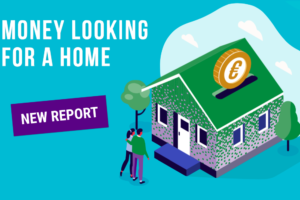REPORT: Scaling-up buildings renovation with ECB credit policy

New Positive Money Europe policy paper written together with Uuriintuya Batsaikhan proposes to turn the European Central Bank’s Targeted Longer-Term Refinancing Operations (TLTROs) programme into a dedicated financial instrument to scale up bank loans for energy efficiency and building renovations.
Under TLTROs, the ECB currently provides €1.75 trillion of loans to banks with negative interest rates (-1%), but without climate or environmental conditions. Because of this negative interest rate, the programme is effectively a public subsidy for banks. The report proposes to launch a “Renovation-TLTROs” pilot programme under which the TLTRO rules would be tweaked to offer a super-negative discount rate (below the current -1.0%) to banks on their portfolio of loans that are dedicated to energy-efficiency renovation projects.
Key points of the paper:
- With its “Renovation Wave” initiative, the European Commission has rightly identified improving the energy efficiency of buildings through renovations as a key priority for the EU’s climate strategy. However, without scalable financial firepower, the plan is doomed to disappoint on its ambition to double the pace of building renovation by 2030.
- The discount rate offered under the Renovation TLTROs programme would boost incentives by banks to extend credit for renovation purposes, by reducing the transaction costs for banks and customers;
- It will incentivize and facilitate the process of setting up renovation projects for millions of households and businesses, by turning the banking sector into a distributed network of one-stop-shops for energy-efficiency renovations;
- Easier access to bank loans for renovations will incentivise households and businesses to carry out deep renovations instead of lighter and insufficient projects;
- With mainstream access to virtually costless renovation loans, a number of existing public subsidies for renovation could be redirected towards public and social housing or for enhanced and targeted support for low-income households, empowering a fairer and just green transition.
This report was written in my (former) capacity of executive director of Positive Money Europe.
This post is also available in: French
